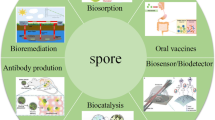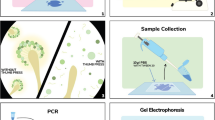Summary
The sporophores of Pleurotus are gymnocarpous and continuously release spores in the atmosphere causing respiratory allergies like hay fever and farmer’s lung disease among workers. The allergy is caused by the antigens present on the walls of the spores. Apart from this, during commercial production, these spores settle on the fruit bodies, germinate and form a velvety film which gives an unpleasant appearance to the mushrooms. The spores emitted may include new genotypes likely to attack wood or trees. Spore allergy is one of the most important limiting factors for the large scale cultivation of this species. Different approaches are being adopted at IIHR for the production of commercial sporeless/low-sporing strains of Pleurotus to alleviate the spore allergy problem. Attempts were made during the present investigation to produce sporeless or low-sporing mutants through u.v. mutation. Mutation of the mycelium did not yield the desired results. Mutation of the spores of Pleurotus sajor-caju yielded an extremely low-sporing mutant after 75 min exposure. The character has been found to be stable for more than 10 generations of subculturing.
Similar content being viewed by others
References
Baars, J.J.P., Sonnenberg, A.S.M., Mikosch, T.S.P. & Van Griensven L.J.L.D. 2000 Development of a sporeless strain of oyster mushroom Pleurotus ostreatus: In Proceedings of the 15th International Congress on the Science and Cultivation of Edible Fungi held in the Netherlands ed Van Griensven, L.J.L.D. Mushroom Science, XV, pp. 317–326
Eger G., Eden G. and Wissing E. (1976). Pleurotus ostreatus, breeding potential of a new cultivated mushroom. Theoretical and Applied Genetics 47: 155–163
Food and Agriculture Organization of the United Nations http://faostat.fao.org
Hausen B.M., Schulz K.H. and Noster U. (1974). Allergic disease caused by the spores of an edible fungus Pleurotus florida. Mushroom Science 9: 219–225
Imbernon M. and Labarere J. (1989). Selection of sporeless or poorly spored induced mutants from Pleurotus ostreatus and Pleurotus pulmonarius and selective breeding. Proceedings of the 12th International Congress on the Science and Cultivation of Edible Fungi, held in Germany, Mushroom Science XII(part1): 109–123
Leallara H. (1977). Is sporelessness in Pleurotus ostreatus an infectious agent? Proceedings of the 10th International Congress on the Science and Cultivation of Edible Fungi held in France. Mushroom Science X(part 1): 145–154
Olsen J.A. (1987). Pleurotus spores as allergens. Mushroom Journal 172: 115–117
Pandey M. and Tewari R.P. (1989). A natural sporeless variant of Pleurotus. Indian Journal of Mushrooms 15: 25–28
Pandey M. and Tewari R.P. (2004). Development of sporeless/low spored strains of Pleurotus through di-mon matings. Mushroom Research 13: 17–20
Sakula A. (1974). Allergy to the spores of Pleurotus florida. The Lancet 1: 137
Sonnenberg A.S.M., Van Loon P.C.C. and Van Griensven L.J.L.D. (1996). The number of spores spread by Pleurotus Spp in the air/Het aantal sporen dat Pleurotus spp in de lucht verspreid. De Champignoncultuur 40: 269–272
Zadrazil P. (1974). Pleurotus-Sporen als Allergene. Naturwissenschaften 61: 456
Author information
Authors and Affiliations
Corresponding author
Rights and permissions
About this article
Cite this article
Ravishankar, S., Pandey, M., Tewari, R.P. et al. Development of sporeless/low sporing strains of Pleurotus through mutation. World J Microbiol Biotechnol 22, 1021–1025 (2006). https://doi.org/10.1007/s11274-005-2891-7
Received:
Accepted:
Published:
Issue Date:
DOI: https://doi.org/10.1007/s11274-005-2891-7




